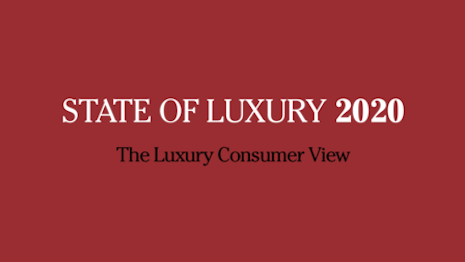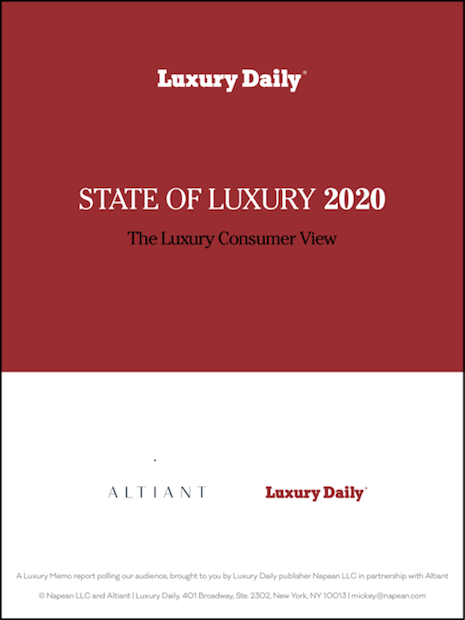 State of Luxury 2020: Consumer View: COVID-19 has jumbled predictions but the underlying fundamentals of luxury remain strong even as the consumer may pull back this year
State of Luxury 2020: Consumer View: COVID-19 has jumbled predictions but the underlying fundamentals of luxury remain strong even as the consumer may pull back this year
In January, Luxury Daily and market researcher Altiant unveiled The State of Luxury 2020: Consumer View, a revealing piece of research covering affluent and high-net-worth individuals in key markets.
The collected data from the United States, United Kingdom and Chinese wealthy consumers was meant to ascertain key luxury projections and behavior for the year ahead.
However, the health crisis bought on by the COVID-19 outbreak has affected nearly all luxury sectors.
With large sets of strong data at hand, both organizations have revisited some of the most relevant insights to help industry professionals cope with the changes unfolding before their eyes.
Only few months ago, consumer confidence was at a high level as three in five affluent and HNW individuals expected to increase their luxury spending in the year ahead.
The uncertainty of the current situation, likely to lead to a U-shaped recession, will be shifting the position of many.
Prognostications over the upcoming spend will certainly depend on how strength of the overall damage.
Altiant is monitoring COVID-19’s impact on the wealthy population’s finances with regular notifications and updates as the environment evolves (see Covid19 & The Top 5% Pulse).
Luxury Daily turned to Meryam Schneider, vice president of marketing and partnerships at Paris-based Altiant, to shed light on some new developments since the research’s debut:
Unique experience on all possible channels, an unchanging expectation of the wealthy consumer
More than ever, the demand for luxury brands to provide high quality, bespoke customer experiences should be considered, whether in-person or online.
Indeed, poor customer service is the leading deterrent when buying luxury goods/services (53 percent), meaning that luxury brands have to create memorable interactions with consumers in difficult times, maybe through phone interactions or video chats.
In this State of Luxury 2020: Consumer View, we collected hundreds of quotes describing what a great luxury customer experience looks like for this affluent population.
In times of restricted movements: Family and friends as first source of influence for luxury purchases
When asked about the sources of influence for luxury purchase decisions, the panel of 450-plus luxury buyers ranked first their family and friends as the first sources of influence, then “Brand posts on social media” at the same level as “Sustainability/Ethics of the company” (44 percent).
Marketers need to ensure that their claims truly reflect the ethos of the brand.
In a world of lockdowns and confinement, family and friends will become even more important and the winning brands could be those cutting through the online noise.
An interesting point that might have seemed counter-intuitive to marketers at the time was the low performance of influencers in the wealthy consumer’s purchase decision. Only 26 percent of the wealthy respondents over these markets consider online influencers as an influencing force, much lower than the brands’ own posts.
The case for luxury travel
Luxury travel was very well placed to continue growing as 52 percent of the wealthy population said that they expected to spend more on holidays in 2020.
Inevitably, growing limitations and bans on people’s movements have put a serious pause to this trend, putting an entire industry down to immobility.
However, one of the key highlights not to be ignored is the strong and growing appetite for wellness travel.
Wellness and wellbeing remains a strong demand from the affluent consumer. Innovative ways to reach out to the travel minded consumer will be key through the wide world of IoT, VR and other AI-powered connections.
On the other hand, some trends observed before COVID-19 are likely to strengthen, such as the social phenomenon of flight-shaming let by environmental activists which could now be joined for other motivations such as tampering spreads of viruses.
The travel industry will certainly need to show its resilience and innovative power of adaptation.
Additionally, with taxpayer bailouts likely for many airlines and hotels around the world, hospitality marketers should show genuine appreciation to the customers when they return as this will help to reconnect consumers to the sector.
The case for rental and secondhand
The de-stigmatized luxury rental and resale markets, ramping-up stars in the luxury fashion industry (see key data points in our previous report dedicated to these new models of ownership), were showing ongoing growth in popularity.
In a new world threatened by a viral pandemic and with a society just starting to understand the infectiousness of the disease on surface and textile, the rental and secondhand markets’ growth are likely to drop in comparison to more traditional models.
 State of Luxury 2020 The Luxury Consumer View
State of Luxury 2020 The Luxury Consumer View